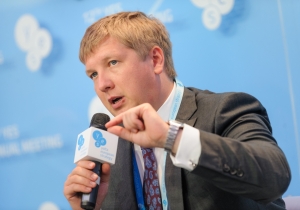Ukrainian Gas Chief Says Shifting Russian Gas Transit to Nord Stream-2 will Cut Supply to Some European States

Changing the Russian gas transfer route from Ukraine to the Nord Stream-2 gas line will shorten gas supply for a number of countries in Europe and will also open up the possibility of manipulation by Russia’s Gazprom, Chairman of the Board of Naftohaz Ukrayiny, Andriy Kobolev, said today at the 12th Yalta European Strategy (YES) Annual Meeting in Kiev.
“Launching the Nord Stream-2 gas line would not only significantly reduce the volume of gas transit through Ukraine, but would also shorten supplies to the entire region. If you take a look at the map, you will see that 90-100% of gas comes to the region from Russia. If this gas goes through the Nord Stream–1 and 2 gas lines, there are some bottlenecks there. These are Germany, the Czech Republic and Slovakia. Presence of these bottlenecks means lack of gas, and this may become subject to manipulation”, Kobolev said.
Kobolev also said that as of now, Ukraine has accumulated 15bn m.cu of gas in its underground gas storages, this is not yet enough, but preparation for the wintertime still continues actively.
According to Kobolev, based on the results of discussions with the European financing institutions, Naftohaz Ukrayiny is optimistic about financing the procurement of additional volumes of gas to fill the underground storage.
“Certainly, this does not remove the need for signing a new agreement with Gazprom. We are looking forward to signing that agreement in September”, Kobolev said.
The 12th Yalta European Strategy Annual Meeting will be streamed live at yes-ukraine.org as well as web-sites of the Media Partners in English and Ukrainian.
The official Twitter of the 12th YES Annual Meeting is @yes_ukraine, and participants and followers can include the hashtag: #YESUkraine2015.
←Back to news list

